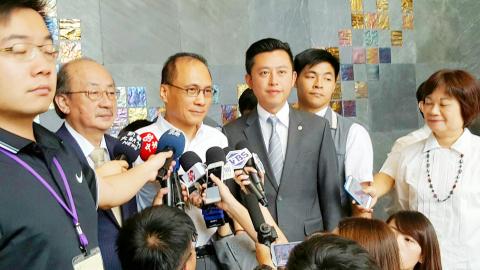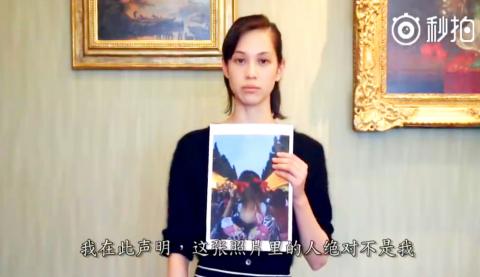Premier Lin Chuan (林全) yesterday said that actors and actresses should be judged on their acting, not their politics, after Taiwanese director-actor Leon Dai (戴立忍) was replaced in a Chinese movie over his “unclear” political stance.
“People in the entertainment business should be evaluated for their professional performance, not their political stance,” Lin said. “In any society, it is more important for people in the entertainment industry to do their best in performing.”
“I hope this will not become a regular occurrence,” he said.

Photo: Tsai Chang-sheng, Taipei Times
Lin said that the Ministry of Culture had launched policies to improve the entertainment industry so actors and actresses could develop their careers more fully.
Lin made the remarks in response to reporters’ questions on the replacement of Dai in the film No Other Love (沒有別的愛) directed by Chinese actress Zhao Wei (趙薇).
Dai was accused of supporting “Taiwanese independence” because of his participation in social movements in Taiwan — including campaigns against nuclear power, the Sunflower movement and a campaign by high-school students against changes to history curriculum guidelines — and his support of a call by Hong Kong’s pro-democracy advocates for the direct election of the territory’s chief executive.

Screengrab from the Internet
After his removal was announced, Dai issued a 3,000-word statement denying the accusations.
In a post on Sina Weibo (新浪微博) on Friday evening, Dai detailed his family background, saying he was born to a father who fled to Taiwan amid the Chinese Civil War in the 1940s and a mother whose family has been in Taiwan for generations.
He said both Taiwan and China are his roots, adding that he believes he is an authentic Chinese, while stressing that he never supported or campaigned for Taiwanese independence.
He said he spoke during the Sunflower movement, not because he was opposed to the cross-strait trade pact, which the protests were aimed at, but because he did not want to see the movement end in bloodshed.
He said that a picture of him holding a placard supporting the direct election of Hong Kong’s chief executive emerged because someone came to him with the placard and asked for a photograph together and that he agreed without giving it a second thought.
Dai said that he criticized then-minister of education Wu Se-hwa’s (吳思華) changes to high-school curriculum guidelines because a student committed suicide.
“My participation in civil movements was not political,” Dai said.
Dai said he understood the decision to replace him in the movie and he apologized to investors in the film and the crew for the controversy surrounding his past.
Another actor in the movie issued an apology and responded to criticism that she was anti-China.
In an video posted online on Friday night, Japan-based model/actress Kiko Mizuhara responded to three recent incidents that were at the center of criticism against her among the online community.
Chinese netizens said a photograph at Tokyo’s Yasukuni Shrine, which honors people who died fighting on behalf of the Japanese emperor, including 30,304 Taiwanese soldiers killed in World War II, showed Mizuhara visiting the site, which is seen by many as a symbol of Japan’s wartime militarism.
She denied being in the photograph.
Regarding another image, she said she was accused of “posing offensively in front of a flag.”
However, “I am not in the picture,” Daniel said.
Netizens in China also said she “liked” a photograph posted on Instagram in 2013 by a friend of hers that showed a man gesturing toward a structure at Tiananmen Square in Beijing.
Mizuhara said that she “liked” the photo to encourage her friend to make more use of social media.
Mizuhara’s father is American and her mother is a Japan-born South Korean. Mizuhara was born in the US and moved to Japan at age two.
Additional reporting by CNA

Taiwan is projected to lose a working-age population of about 6.67 million people in two waves of retirement in the coming years, as the nation confronts accelerating demographic decline and a shortage of younger workers to take their place, the Ministry of the Interior said. Taiwan experienced its largest baby boom between 1958 and 1966, when the population grew by 3.78 million, followed by a second surge of 2.89 million between 1976 and 1982, ministry data showed. In 2023, the first of those baby boom generations — those born in the late 1950s and early 1960s — began to enter retirement, triggering

ECONOMIC BOOST: Should the more than 23 million people eligible for the NT$10,000 handouts spend them the same way as in 2023, GDP could rise 0.5 percent, an official said Universal cash handouts of NT$10,000 (US$330) are to be disbursed late next month at the earliest — including to permanent residents and foreign residents married to Taiwanese — pending legislative approval, the Ministry of Finance said yesterday. The Executive Yuan yesterday approved the Special Act for Strengthening Economic, Social and National Security Resilience in Response to International Circumstances (因應國際情勢強化經濟社會及民生國安韌性特別條例). The NT$550 billion special budget includes NT$236 billion for the cash handouts, plus an additional NT$20 billion set aside as reserve funds, expected to be used to support industries. Handouts might begin one month after the bill is promulgated and would be completed within

The National Development Council (NDC) yesterday unveiled details of new regulations that ease restrictions on foreigners working or living in Taiwan, as part of a bid to attract skilled workers from abroad. The regulations, which could go into effect in the first quarter of next year, stem from amendments to the Act for the Recruitment and Employment of Foreign Professionals (外國專業人才延攬及僱用法) passed by lawmakers on Aug. 29. Students categorized as “overseas compatriots” would be allowed to stay and work in Taiwan in the two years after their graduation without obtaining additional permits, doing away with the evaluation process that is currently required,

IMPORTANT BACKER: China seeks to expel US influence from the Indo-Pacific region and supplant Washington as the global leader, MAC Minister Chiu Chui-cheng said China is preparing for war to seize Taiwan, Mainland Affairs Council (MAC) Minister Chiu Chui-cheng (邱垂正) said in Washington on Friday, warning that Taiwan’s fall would trigger a regional “domino effect” endangering US security. In a speech titled “Maintaining the Peaceful and Stable Status Quo Across the Taiwan Strait is in Line with the Shared Interests of Taiwan and the United States,” Chiu said Taiwan’s strategic importance is “closely tied” to US interests. Geopolitically, Taiwan sits in a “core position” in the first island chain — an arc stretching from Japan, through Taiwan and the Philippines, to Borneo, which is shared by